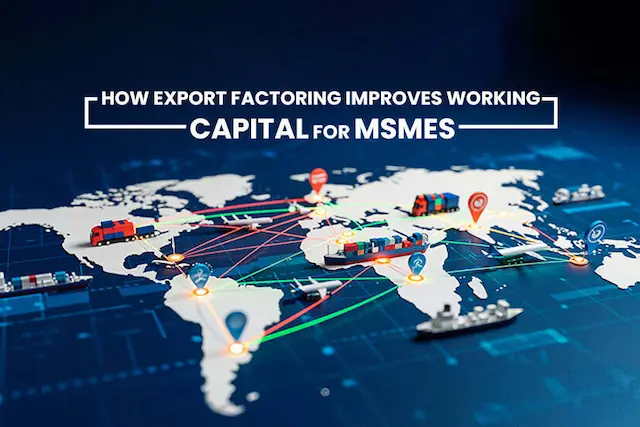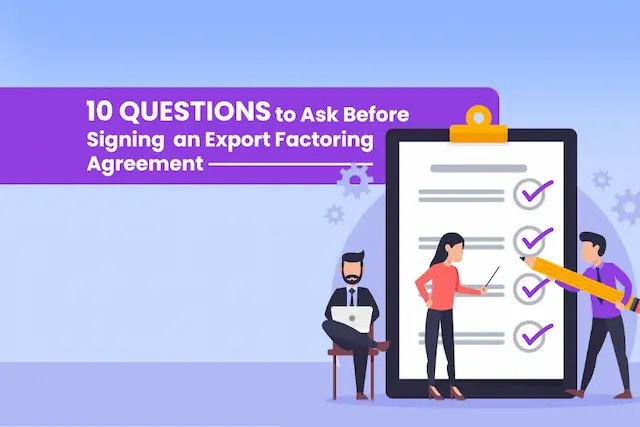In the dynamic world of international trade, efficient financial tools play a crucial role in fostering smooth transactions between buyers and sellers. One such indispensable element in the trade finance ecosystem is export factoring. This financial practice serves as a reliable bridge, simplifying the complexities of cross-border commerce.
Export factoring essentially involves a third-party financial institution, known as a factor, stepping in to facilitate the sale of goods or services between a seller and a foreign buyer. The process begins when the exporter sells its accounts receivable (unpaid invoices) to the factor at a discount. In return, the exporter gains immediate access to funds, while the factor assumes the responsibility of collecting payment from the buyer.
This arrangement not only enhances cash flow for exporters but also mitigates the risks associated with delayed payments and non-payment. Export factoring acts as a win-win solution, promoting confidence among trading partners and fostering a more secure and efficient global trade environment.
As we delve deeper into the realm of trade finance, understanding the nuances of export factoring becomes pivotal for businesses aiming to navigate the international market seamlessly.
Also Read: What is the Difference Between Trade Finance and Invoice Factoring?
Understanding Export Factoring in Trade Finance Ecosystems
Export factoring streamlines international trade by involving exporters, factors (financial intermediaries), and importers. Exporters sell accounts receivable to factors, gaining quick access to funds, while factors handle collection from foreign buyers. This collaborative process enhances cash flow, minimizes risks, and fosters efficient cross-border transactions in the trade finance ecosystem.
Practical Example of Export Factoring in Trade Finance Ecosystems

Consider a scenario where a manufacturing company based in Country A exports goods to a distributor in Country B. To expedite cash flow, the exporter engages in export factoring:
Agreement
The exporter and a factor, a specialized financial institution, enter into an agreement. The exporter agrees to sell its accounts receivable to the factor at a discounted rate.
Shipment and Invoice
The exporter ships the goods to the distributor in Country B and issues an invoice for the transaction, specifying payment terms.
Factoring Process
The exporter submits the invoice details to the factor. The factor verifies the creditworthiness of the distributor and agrees to purchase the accounts receivable, providing the exporter with immediate funds.
Immediate Funds
The exporter receives a percentage (typically 70-90%) of the invoice amount upfront, improving cash flow and allowing for operational flexibility.
Collection by Factor
The factor takes on the responsibility of collecting payment from the distributor on the agreed-upon due date. This relieves the exporter from the burden of chasing payments.
Balanced Risks
By utilizing export factoring, the exporter mitigates the risk of delayed or non-payment, as the factor assumes the credit risk associated with the foreign buyer.
Efficient Trade Cycle
The distributor in Country B pays the factor directly on the due date, completing the transaction. This streamlined process ensures a more efficient trade cycle for both the exporter and the distributor.
In this practical example, export factoring facilitates a smoother and more secure international trade transaction, benefiting both the exporter and the factor in the trade finance ecosystem.
Key Players in Export Factoring in the Trade Finance Ecosystem
In the intricate web of international trade finance, several key players contribute to the seamless functioning of export factoring. These players play distinct roles, each vital in ensuring the success of transactions and the financial stability of businesses engaged in cross-border commerce.
Exporters
At the heart of export factoring are the exporters, businesses that sell goods or services to foreign buyers. Exporters utilize factoring services to improve their cash flow, minimize credit risks, and expedite their access to funds by converting accounts receivable into immediate cash.
Factors
Factors are financial institutions or specialized firms that provide export factoring services. They act as intermediaries, purchasing the accounts receivable from exporters at a discounted rate. Subsequently, factors manage the collection process, assuming the responsibility of securing payments from the foreign buyers.
Importers/Buyers
Importers or buyers represent the foreign entities purchasing goods or services from exporters. Their creditworthiness and payment history play a significant role in determining the feasibility of export factoring transactions.
Banks
Financial institutions, including banks, often play a crucial role in supporting export factoring arrangements. They may provide credit lines to factors, facilitating the purchase of accounts receivable from exporters. Additionally, banks may offer letters of credit to enhance the security of international transactions.
Credit Insurance Companies
These entities specialize in providing credit insurance to safeguard exporters against the risk of non-payment by foreign buyers. Exporters may collaborate with credit insurance companies to add an extra layer of protection to their transactions.
Understanding the roles of these key players is essential for businesses navigating the complexities of international trade finance. The synergy between exporters, factors, importers, banks, and credit insurance companies contributes to the resilience and efficiency of the export factoring process in the broader trade finance ecosystem.
Export Factoring Role in Trade Finance
Export factoring plays a pivotal role in the intricate tapestry of the trade finance ecosystem, offering multifaceted benefits that extend beyond mere financial transactions. Let’s delve into the nuanced dimensions that define the significance of export factoring:
Liquidity Unleashed
At its core, export factoring acts as a dynamic catalyst, infusing much-needed liquidity into the veins of the trade finance ecosystem. This financial infusion is particularly instrumental in addressing the temporal disjunction between invoicing and payment, a challenge often accentuated in international transactions characterized by extended payment terms.
Robust Risk Mitigation
Export factoring emerges not just as a financial instrument but as a robust shield against risks inherent in cross-border trade. Factors, as guardians of financial prudence, extend credit protection services, thereby curtailing the ominous specter of non-payment due to buyer insolvency or default. This, in turn, emboldens businesses to engage in transactions across unfamiliar global landscapes with a heightened sense of confidence.
Catalyst for Growth
Positioned as a veritable growth enabler, export factoring assumes particular significance for small and medium-sized enterprises (SMEs). By providing access to working capital sans the shackles of additional debt, it propels SMEs towards expansion into new markets and diversification of product lines.
Efficiency Coupled with Expertise
Beyond its financial dimension, export factoring harnesses the acumen of factors who are adept in the intricacies of international trade. Their profound understanding of cross-border transactions and well-established global networks bestows businesses with a strategic advantage in navigating the labyrinthine complexities of global commerce.
Debt Alleviation
Diverging from conventional financing mechanisms, export factoring operates as a fiscally astute choice by not burdening companies with additional debt. Instead, it artfully leverages accounts receivable, thereby fostering an environment conducive to improved financial stability.
Tailored Financing Flexibility
Export factoring distinguishes itself through its bespoke financing solutions, meticulously crafted to align with the distinctive needs of businesses. Factors exhibit a remarkable capacity to tailor their services, whether directed towards specific industries, markets, or varying transaction magnitudes.
Competitive Edge in Global Markets
The adoption of export factoring emerges as a strategic maneuver, endowing businesses with a competitive edge on the global stage. By extending flexible payment terms to overseas buyers, businesses not only enhance their allure but also nurture robust and enduring customer relationships.
In essence, export factoring transcends conventional financial paradigms, emerging as a dynamic force that not only fuels financial transactions but also fortifies the very foundations of international trade.
Also Read:Key Factors to Look for When Evaluating Export Factoring Services
Export Factoring: Powering Global Growth
Export factoring goes beyond transactions, becoming a strong force in global trade. It’s not just about money; it sparks economic vitality by ensuring stability, managing risks, and boosting cash flow. Think of it as the music in the international dance between buyers and sellers, making deals smoother.
Its influence isn’t confined to boardrooms; it spreads across the economy, bringing stability and supporting growth. This has a domino effect, creating jobs and encouraging businesses to explore new opportunities.
In this teamwork of smart finance and global business, export factoring steps up as a hero, guiding businesses into fresh markets. Its impact isn’t just about making deals work better; it’s about businesses growing, connecting economies like pieces of a puzzle. Simply put, export factoring quietly powers the beat of global trade, turning different pieces into a harmonious tune of economic success.
Final Note
In the big world of buying and selling worldwide, export factoring is like a secret superhero. It helps things go smoothly between the people selling stuff and the ones buying it. It’s not just about money; it keeps things steady, takes away risks, and makes sure there’s enough cash. Think of it as the boss in a music band, making sure everyone plays together. Export factoring is not just about deals; it quietly helps businesses grow and makes the global trade dance sound great.
So, when businesses go global, export factoring is like their friendly guide, making sure everything clicks in the world of buying and selling.
Also Read: Why is Export Factoring Important to Your Business?





